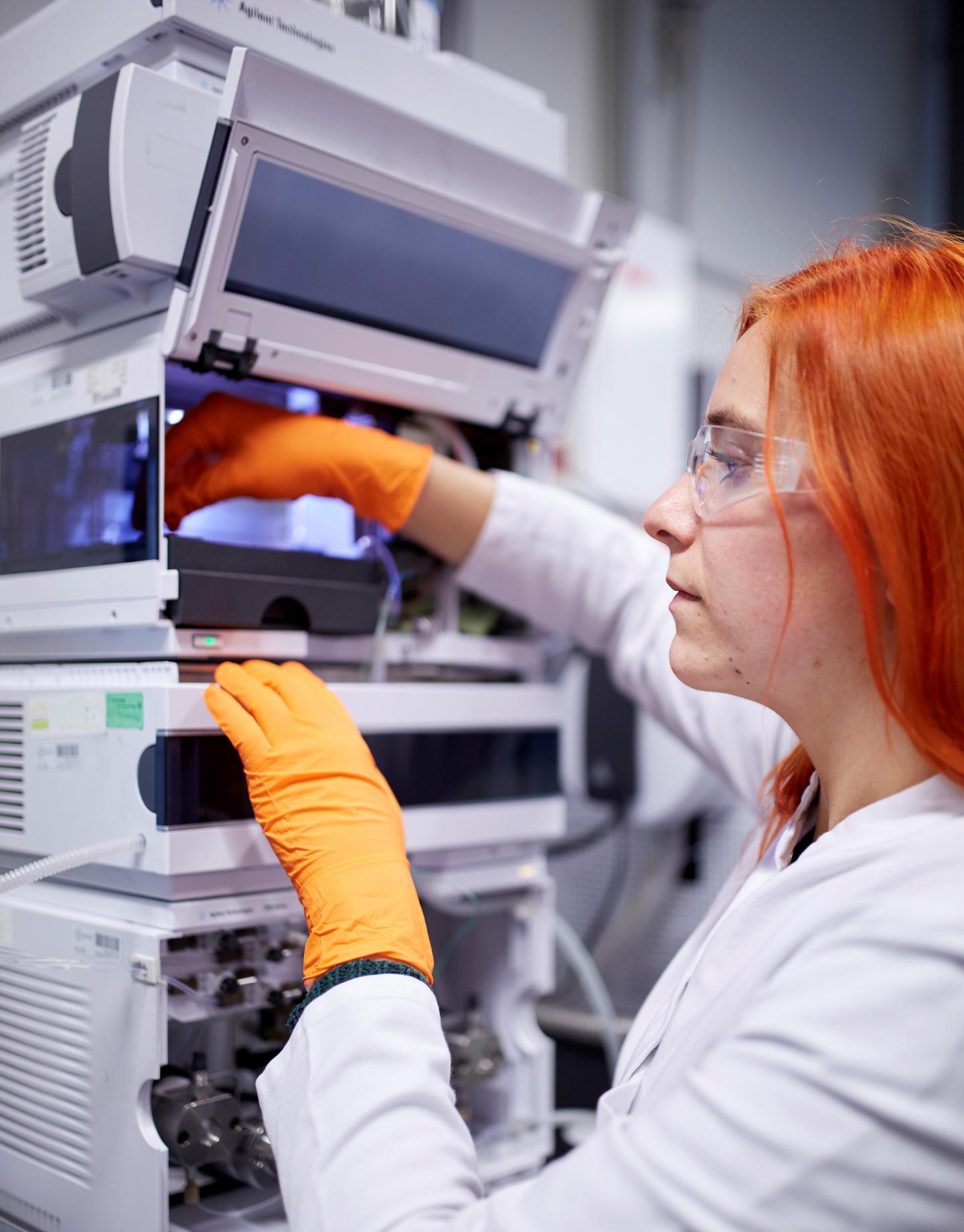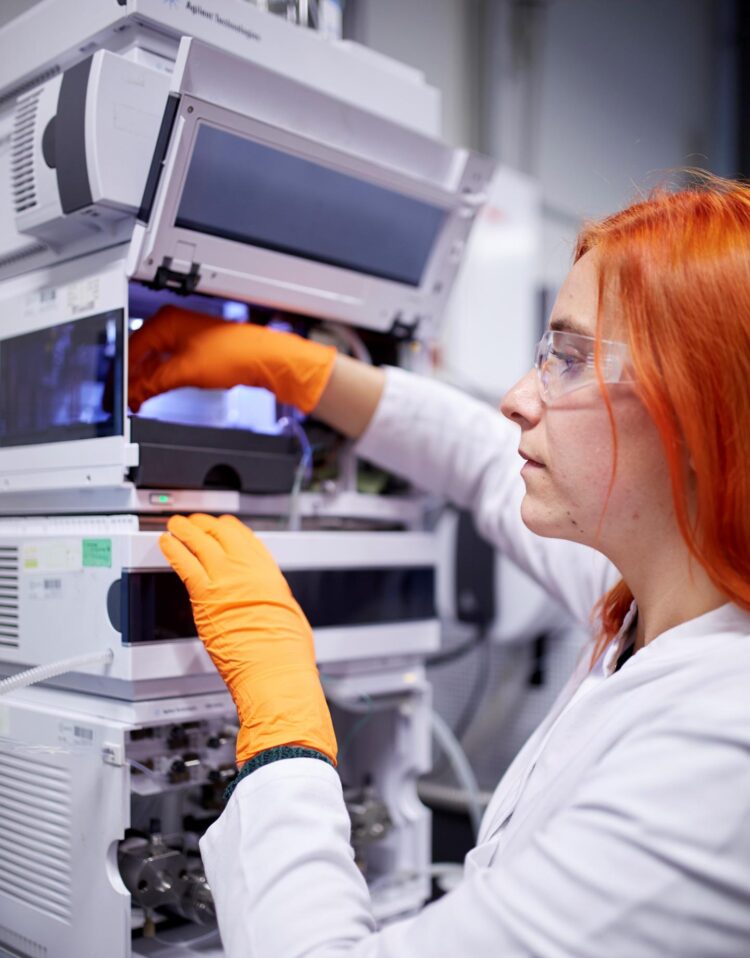New technology enables ultrafast identification of COVID-19 biomarkers

Credit: Photo: Arne Sattler/Charité
Researchers from Charité – Universitätsmedizin Berlin and the Francis Crick Institute have developed a mass spectrometry-based technique capable of measuring samples containing thousands of proteins within just a few minutes. It is faster and cheaper than a conventional blood count. To demonstrate the technique’s potential, the researchers used blood plasma collected from COVID-19 patients. Using the new technology, they identified eleven previously unknown proteins which are markers of disease severity. The work has been published in Nature Biotechnology*.
Thousands of proteins are active inside the human body at any given time, providing its structure and enabling reactions which are essential to life. The body raises and lowers the activity levels of specific proteins as required, including when responding to external factors such as pathogens and drugs. The detailed patterns of the proteins found inside cells, tissues and blood samples can therefore help researchers to better understand diseases or make diagnoses and prognoses. In order to obtain this ‘protein fingerprint’, researchers use mass spectrometry, a technology known to be both time-consuming and cost-intensive. ‘Scanning SWATH’, a new mass-spectrometry-based technology, promises to change this. Developed under the leadership of Prof. Dr. Markus Ralser, Director of Charité’s Institute of Biochemistry, this technology, which is much faster and cost-effective than previous methods, enables researchers to measure several hundred samples per day.
“In order to speed up this technology, we changed the mass spectrometer’s electric fields. The data produced are of such extreme complexity that humans can no longer analyze them,” explains Einstein Professor Prof. Ralser, who is also a Group Leader at the Francis Crick Institute in London. He adds: “We therefore developed computer algorithms that are based on neural networks and which use these data to extract the relevant biological information. This enables us to identify thousands of proteins in parallel and greatly reduces measuring timescales. Fortunately, this method is also more precise.”
This high-throughput technology has a broad range of potential applications, ranging from basic research and large-scale drug development to the identification of biological markers (biomarkers), which can be used to estimate an individual patient’s risk. The technology’s suitability for the latter was demonstrated by the researchers’ study on COVID-19. As part of this research, the team analyzed blood plasma samples from 30 Charité inpatients with COVID-19 of varying degrees of disease severity, comparing the protein patterns obtained with those of 15 healthy individuals. The actual measurements conducted on individual samples only took a few minutes.
The researchers were able to identify a total of 54 proteins whose serum levels varied according to the severity of COVID-19. While 43 of these proteins had already been linked to disease severity during earlier studies, no such relationship had been established for 11 of the proteins identified. Several of the previously unknown proteins associated with COVID-19 are involved in the body’s immune response to pathogens which increases clotting tendency. “In the shortest of timeframes, we discovered protein fingerprints in blood samples which we are now able to use to categorize COVID-19 patients according to severity of disease,” says one of the study’s lead authors, Dr. Christoph Messner, who is a researcher at Charité’s Institute of Biochemistry and the Francis Crick Institute. He continues: “This type of objective assessment can be extremely valuable, as patients will occasionally underestimate the severity of their disease. However, in order to be able to use mass spectrometry analysis for the routine categorization of COVID-19 patients, this technology will need to be refined further and turned into a diagnostic test. It may also become possible to use rapid protein pattern analysis to predict the likely course of a case of COVID-19. While the initial findings we have collected are promising, further studies will be needed before this can be used in routine practice.”
Prof. Ralser is convinced that mass spectrometry-based investigations of the blood could one day complement conventional blood count profiles. “Proteome analysis is now cheaper than a complete blood count. By identifying many thousands of proteins at the same time, proteomic analysis also produces far more information. I therefore see enormous potential for widespread use, for instance in the early detection of diseases. We will therefore continue to use our studies to develop proteome technology for this type of application.”
###
*Messner CB et al. Ultra-fast proteomics with Scanning SWATH. Nat Biotech (2021). DOI: 10.1038/s41587-021-00860-4
About the study
The study is the result of a collaboration with the University of Cambridge, United Kingdom, the Chalmers University of Technology, Sweden, the Bernhardt Nocht Institute for Tropical Medicine in Hamburg, Germany, and SCIEX, a Canadian manufacturer of mass spectrometers.
Mass spectrometry
Mass spectrometry is an analytical technique used to measure the mass of molecules and atoms. The substance to be analyzed is first converted into gas-phase molecules which are subsequently converted into ions. Once accelerated to high velocity by an electrical field, these ions are then sorted by the mass spectrometer system’s analyzer and separated according to their mass/charge ratios. The resulting mass spectrum provides information on a substance’s molecular composition. Mass spectrometry is suitable for the identification, characterization and quantification of a myriad of biomolecules such as proteins, metabolites, sugars and fats, all of which behave differently depending on the precise clinical picture which manifests in a particular patient.
Proteomics platform to study COVID-19 at Charité
The data underpinning the published article were generated using the Pa-COVID-19 platform. Pa-COVID-19 is a prospective registry study for patients with COVID-19 at Charité. The aim of the registry is to collate comprehensive clinical and molecular data on patients with COVID-19 in order to identify individual risk factors for severe disease, as well as prognostic biomarkers and treatment targets. The protocol for the study is available here: https:/
Media Contact
Prof. Dr. Markus Ralser
[email protected]
Original Source
https:/
Related Journal Article
http://dx.





